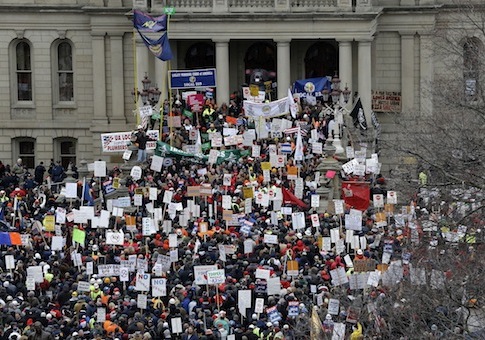One out of three union households in the United States would leave their labor groups if given the chance, according to a new survey.
Sponsors of National Employee Freedom Week surveyed more than 10,000 union households across the country asking them if they were aware of Beck Rights—the freedom to opt out of unions—and what they would do if they could leave their union "without penalty or threat of losing your job."
More than 33 percent of all unions households said that they’d leave the union if given the chance, including more than 36 percent in heavily unionized California and 44 percent in right-to-work state Utah.
"Numbers were high in both kinds of states and that experience is the whole point of the week. Unions are going to either prove their value or suffer the consequences," said NEFW executive director Victor Joecks.
NEFW is teaming with more than 60 national and state-based organizations to raise awareness that employees can opt out of union representation in right-to-work states and to opt out of full dues payments in states with forced unionism. The groups are reaching out to union households directly and through social media.
"Workplace bullying and intimidation are a real factor employees across the country face; we hope to empower workers to let them know that they’re not alone," Joecks said.
Fred Wszolek, spokesman for labor watchdog and NEFW sponsor Workforce Fairness Institute, said information would help to empower individual employees, especially those who are unsatisfied with their representation.
"That survey tells you how many folks think they’re not getting any return on investment for union dues," he said. "A huge amount of dues money is dedicated to things that don’t benefit the worker: political and issues advocacy, organizing in other companies, huge overhead."
The NEFW offers workers sample opt-out sheets tailor made to fit various states laws, but it is not looking to simply weaken unions. Its website links visitors alternative employee groups and associations offering low-cost membership options for representation.
NEFW was born in Nevada in 2011. Joecks approached local teachers in the Clark County School District asking them if they were aware they could opt out of the teachers union, but only between July 1 and July 15—which falls during summer break.
"We were overwhelmed by the response: The union lost 800 dues paying members costing about $600,000 in dues," Joecks said. "I thought if there is this big a reaction from one state, imagine how many more dissatisfied union members there are."
Opting out of the union as an individual has its advantages over working to vote the union out of the workplace. A union can enter the workplace with a bare majority of employees. Exiting is a much different story: Even when union opponents break the 50 percent margin, the NLRB can block the decertification.
Unions enjoy the use of "blocking charges," a process by which labor groups file frivolous unfair labor practice suits to "delay or even cancel employees’ efforts to hold secret-ballot decertification elections," according to Glenn Taubman, attorney for the National Right to Work Legal Defense Foundation, a NEFW sponsor.
"Far too often, the NLRB acts as an ‘incumbent protection squad,’ shielding unions from any challenge to their representational authority, thereby cramming unwanted representation onto unwilling employees," Taubman testified to the House Subcommittee on Health, Education, Labor, and Pensions on Wednesday.
When 50 percent of employees at the Santa Barbara News-Press signed a petition requesting to remove the Teamsters as its collective bargaining unit, the NLRB rejected it, saying it was "untimely filed." The dismissal cited "unfair labor practice" charges filed against the newspaper. A federal appeals court threw out previous union allegations and NLRB enforcements against the newspaper as a violation of the First Amendment in December.
"Blocking charges are regularly misused by union officials" despite existing NLRB rules," Taubmann said in further written testimony to the committee. "Using these tricks to game the system, union officials can remain … even if the vast majority of employees want them out."
Joecks echoed these sentiments saying the group takes the side of the employee, rather than the interest of a business or union.
"If you want to be part of union, great; if not, you should have that freedom to leave," he said. "We’re about options."
